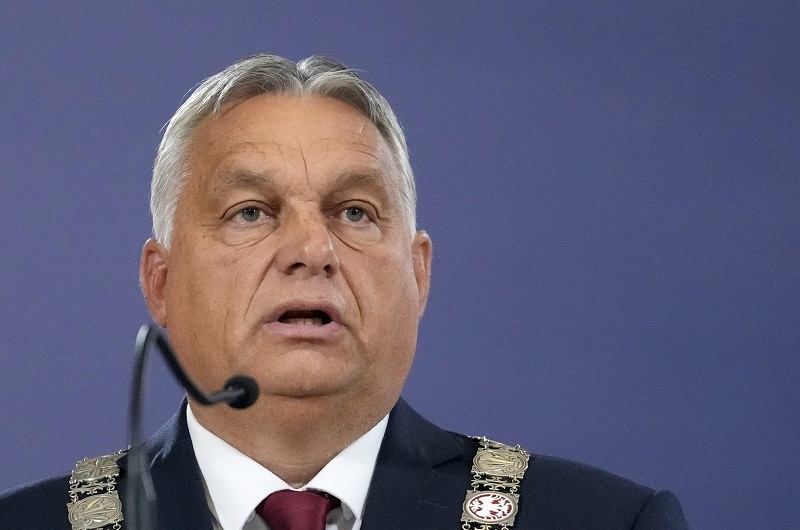
Hungary’s Prime Minister Viktor Orban speaks during a news conference with Serbian President Aleksandar Vucic in Belgrade, Serbia, Friday, Sept. 16, 2022.
10:30 JST, September 19, 2022
BRUSSELS (AP) — The European Union’s executive branch recommended Sunday that the bloc suspend around 7.5 billion euros (dollars) in funding to Hungary over concerns about democratic backsliding and the possible mismanagement of EU money.
The European Commission, which proposes the bloc’s laws and ensures that they are respected, said it was acting “to ensure the protection of the EU budget and the financial interests of the EU against breaches of the principles of the rule of law in Hungary.”
EU Budget Commissioner Johannes Hahn said that despite measures Hungary has proposed to address the deficiencies, the commission is recommending the suspension of funds “amounting to an estimated amount of 7.5 billion euros.”
The money would come from “cohesion funds” granted to Hungary. This envelope of money, one of the biggest slices of the bloc’s budget, helps countries to bring their economies and infrastructure up to EU standards.
EU countries pay around 1% of their gross national income into the budget. Hungary is slated to receive at least 50 billion euros in all from the 2021-27 budget, according to commission estimates.
Any action to suspend the funds must be approved by the EU member countries, and this requires a “qualified majority,” which amounts to 55% of the 27 members representing at least 65% of the total EU population.
They have one month to decide whether to freeze Hungary’s funds, but can in exceptional circumstances extend that period to two months. The commission is recommending that the member countries take until Nov. 19 to allow Hungary more time to address the concerns.
The commission has for nearly a decade accused Hungarian Prime Minister Viktor Orban of dismantling democratic institutions, taking control of the media and infringing on minority rights. Orban, who has been in office since 2010, denies the accusations.
Speaking after a meeting of EU commissioners in Brussels, which unanimously endorsed the move, Hahn welcomed Hungary’s offer to fix the problem, saying that its proposed remedial action goes “in the right direction.”
He said the measures could address some of the commission’s concerns if they are followed up, and properly acted upon. But he said that “a risk for the budget at this stage remains, therefore we cannot conclude that the EU budget is sufficiently protected.”
The commission’s fears focus on public procurement — purchases by the state of goods and services or for the execution of projects using EU funds. Critics say the awarding of such contracts have allowed Orban’s government to channel large sums of EU money into the businesses of politically connected insiders.
A senior EU official pointed to “systematic and systemic irregularities, deficiencies and weaknesses in public procurement related to very high rates of single bidding.” Officials estimate that around half of Hungary’s public tenders are granted after single bidder processes.
The commission also has “serious concerns regarding the detection, prevention and correction of conflicts of interest,” as well as about a number of public interest trusts which manage significant funds, and notably in the area of education.
Hungarian media has reported that Orban’s nationalist government is set to announce new legislation as soon as Monday. EU lawmakers expressed concern last week that this may just be a ploy to gain time.
In a resolution on Thursday, the lawmakers said that Hungary’s nationalist government is deliberately trying to undermine the bloc’s democratic values.
They said that the government in Budapest — which Orban characterizes as an “illiberal democracy” — has become “a hybrid regime of electoral autocracy.” In part, they blame EU member countries for this, for turning a blind eye to possible abuses.
The French Greens parliamentarian who chaperoned the resolution through the assembly, Gwendoline Delbos-Corfield, said that “for the first time, an EU institution is stating the sad truth, that Hungary is no longer a democracy.”
The case, launched by the commission against Hungary in April, is a fresh step in the use of a new mechanism allowing the EU to take action to protect its budget. It does not target member countries for general breaches of EU law.
The mechanism is seen as the EU’s most potent weapon to prevent a worsening anti-democratic drift in some countries. Commission officials have said that Hungary has consistently failed to implement EU recommendations for more than 10 years.
Top Articles in News Services
-

Survey Shows False Election Info Perceived as True
-

Prudential Life Expected to Face Inspection over Fraud
-

Hong Kong Ex-Publisher Jimmy Lai’s Sentence Raises International Outcry as China Defends It
-

Japan’s Nikkei Stock Average Touches 58,000 as Yen, Jgbs Rally on Election Fallout (UPDATE 1)
-

Japan’s Nikkei Stock Average Falls as US-Iran Tensions Unsettle Investors (UPDATE 1)
JN ACCESS RANKING
-

Japan PM Takaichi’s Cabinet Resigns en Masse
-

Japan Institute to Use Domestic Commercial Optical Lattice Clock to Set Japan Standard Time
-

Israeli Ambassador to Japan Speaks about Japan’s Role in the Reconstruction of Gaza
-

Man Infected with Measles Reportedly Dined at Restaurant in Tokyo Station
-

Videos Plagiarized, Reposted with False Subtitles Claiming ‘Ryukyu Belongs to China’; Anti-China False Information Also Posted in Japan

























